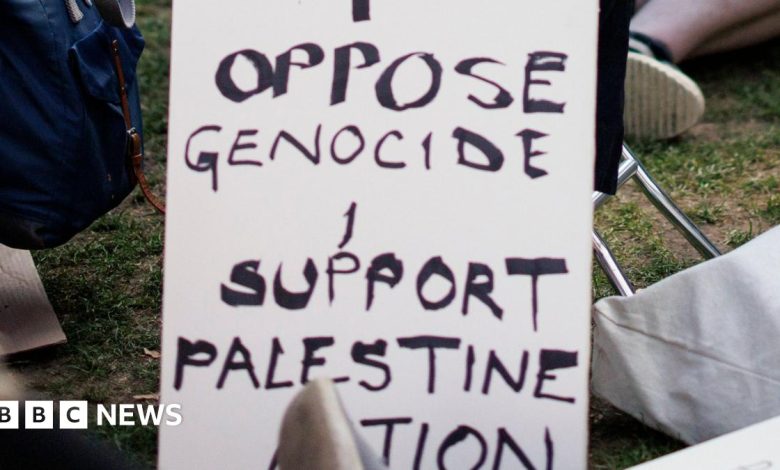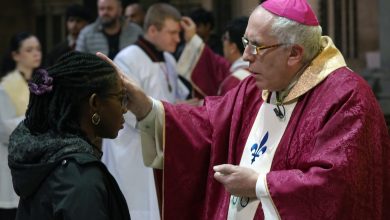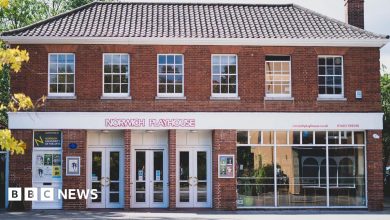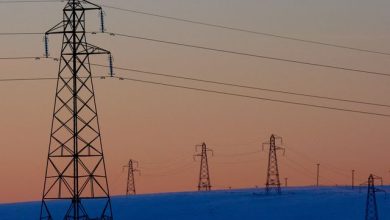Demonstrators arrested at Palestine Action event in Norwich

The story of Palestine Action, a group that has been at the forefront of advocating for Palestinian rights, has taken a dramatic turn. Recently, the Home Secretary, Yvette Cooper, made the decision to ban the group, citing concerns over their involvement in criminal damage to planes at RAF Brize Norton. This ban has significant implications, as it makes membership or support for the group a criminal offense, punishable by up to 14 years in prison. For many, this move has raised concerns about the limits of free speech and the right to protest. The ban has been justified by Cooper as a necessary measure based on “strong security advice” and evidence of the group’s plans for further attacks. However, this decision has been met with criticism from human rights organizations, who argue that it undermines the fundamental rights of individuals to express their opinions and engage in peaceful protest.
The impact of this ban has been felt widely, with mass arrests taking place in the wake of the decision. Amnesty International, a prominent human rights organization, has expressed deep concern over these arrests, highlighting the potential for abuse of power and the erosion of civil liberties. The organization’s chief executive, Sacha Deshmukh, has been vocal in his criticism, emphasizing the need for governments to respect the rights of individuals to express themselves and engage in legitimate protest. This is not just a matter of concern for those directly involved with Palestine Action, but also for the broader community, as it sets a precedent for how governments may respond to dissenting voices. The question on many minds is whether this ban is a necessary measure to protect national security, or an overreach of power that threatens the very foundations of democracy.
At the heart of this controversy is the issue of free speech and the right to protest. Lawyers for Huda Ammori, the co-founder of Palestine Action, argue that the ban is a clear breach of these fundamental rights. They contend that the ban acts as a gag on legitimate protest, silencing voices that are critical of government policies and actions. This is a crucial point, as the ability to criticize and challenge government decisions is essential in a healthy democracy. By banning Palestine Action, the government may be seen as attempting to stifle dissent and limit the ability of individuals to express their opinions. This not only undermines the principles of free speech but also has a chilling effect on others who may wish to engage in similar forms of activism. The fear of criminalization can be a powerful deterrent, and it is this fear that many believe the government is exploiting to suppress dissent.
The legal challenge to the ban is an important development in this story. The High Court’s decision to allow Palestine Action to challenge its proscription is a significant victory for the group and its supporters. It indicates that the judiciary is willing to scrutinize the government’s decision and ensure that it is proportionate and necessary. This challenge will likely focus on the balance between national security and individual rights, with the group’s lawyers arguing that the ban is a disproportionate response to the perceived threat. The outcome of this challenge will be closely watched, as it has implications not just for Palestine Action but for the broader landscape of political activism in the country. It will set a precedent for how governments can respond to groups that engage in disruptive forms of protest, and whether such responses are compatible with the principles of democracy and human rights.
The context in which this ban has been imposed is also crucial. The Israeli-Palestinian conflict is a deeply contentious and emotive issue, with strong feelings on both sides. Palestine Action’s protests and actions, including the damage to planes at RAF Brize Norton, are part of a broader campaign to draw attention to the plight of Palestinians and to challenge what they see as complicity by Western governments in Israeli actions. While the methods used by the group may be controversial, the issue at stake is fundamentally one of human rights and international law. The ban on Palestine Action can be seen as part of a larger pattern of suppressing criticism of Israeli policies, which has significant implications for the ability of individuals and groups to engage in political activism on this issue. It raises questions about the neutrality of governments in international conflicts and their commitment to upholding human rights, even when it is politically inconvenient.
In conclusion, the banning of Palestine Action and the subsequent legal challenge represent a critical moment in the debate over free speech, protest, and national security. The government’s decision to ban the group has been framed as a necessary measure to protect against criminal damage and potential future attacks. However, critics argue that this ban undermines fundamental rights and sets a dangerous precedent for the suppression of dissent. As the legal challenge unfolds, it will be important to consider the broader implications of this decision, not just for Palestine Action but for the future of political activism and the health of democracy. The balance between security and liberty is a delicate one, and it is in moments like these that societies are tested on their commitment to the principles of freedom and justice. The outcome of this challenge will have far-reaching consequences, shaping the boundaries of what is considered acceptable protest and the limits of government power to restrict dissenting voices.









q746i3